Activity at the Ca’ Ximo Bar in the Algemesí industrial estate (Valencia) was completely paralyzed on October 29. The last week of Ximo, the owner of the establishment, far from serving his usual portions, throwing beers or serving coffee to the workers, has consisted of drawing water, cleaning mud and beginning to quantify the countless losses caused by DANA, which has already caused at least 217 deaths and left hundreds missing in the community.
Just over 100 kilometers from this Valencian town is the municipality of Utiel. Javier Ballesteros, a 26-year-old young man, captured a video at 5:26 p.m. on that Black Tuesday that continued to be shared on social networks. In it you can see A firefighter rescuing a woman and her pet from a house comes down with water almost up to their necks.
Seeing all those images and everything that was happening, Pablo Miranzo He decided on Wednesday afternoon to take his SUV and travel from Elche to Paiporta, one of the most affected towns. Since then, he has spent the nights at a friend’s house, in his own car or even in one of the pavilions set up to welcome volunteers while That day he was practicing his profession as a photographer to document the full magnitude of the catastrophe.
All three use very similar terms when describing what their last seven days have been like. Hell, disaster, devastating, panic, tragedy or terror They are words and expressions that come out of their mouths in the conversations that El HuffPost has had with the protagonists of these stories.
When Ximo was able to go to his bar last Thursday after more than a day without being able to leave his house, he found that His premises had been flooded with more than 70 centimeters of water. “The level is more than enough to ruin everything, from the motors of the appliances to the furniture or the food. A disaster,” says the owner, who says through an unstable phone call that this Monday he was finishing throwing away all the food and everything that had been left unused.
Luckily, he was able to leave work last Tuesday at 6:00 p.m. and get home before the water level rose. “I live in a slightly higher area and I haven’t had so many losses at homebut I have colleagues who were caught by water in the industrial park and had to stay and, for example, all of them have lost their cars,” he adds. His sister-in-law, he says, also lost her two vehicles.
One of the streets in the town of Algemesí.
For his part, Ballesteros was at home at the height of the flood. This First Class teacher who works in a factory had arrived home early in the morning when he left work without the floods yet occurring. That made He could see from the terrace of his house how the water level was rising hour after hour.
“I got free and my whole family was at home, so too, but the colleagues who entered the 6 in the morning shift had to staying a whole day at work to sleep with cardboard boxes and almost without being able to communicate,” says the young man, who has not suffered major material damage.
Her aunt, on the other hand, reports that six days later she still had water in her garage and that she had lost everything she had there, just like her friends, who have been left with nothing. But, without a doubt, Ballesteros celebrates a decision by the mayor, Ricardo Gabaldón, which is to close the institutes that Tuesday: “I have one in front of my house and thank goodness there were no classes. “Right now it is almost ready to collapse because on that street the water almost covered the traffic signs.”
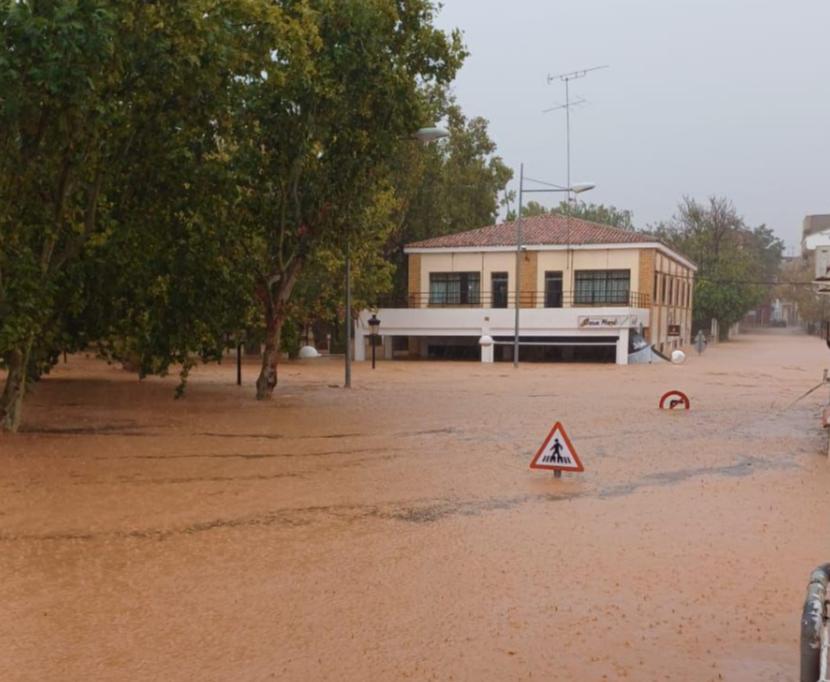
The institute area, in front of Javier Ballesteros’ house, in Utiel.
Miranzo since he arrived in Paiporta and until now he has not stopped capturing scenes that were unthinkable to see in Spain. As soon as he got out of the car on that first night witnessed three lootings, But it was the next day when he was truly aware of the consequences of DANA and what Tuesday night had been like for thousands of neighbors.
“They make your hair stand on end. For example, a girl from Aldaya told me that she lived in a basement and that her neighbor called her to tell her that the water was coming, that it had overflowed in the town above. A few minutes later a wave and pulled her armored door out of the frame despite holding it with her husband. All the water entered them, hit them and in minutes there was 1.70 meters of water level in their house. That was when they were able to go upstairs, but without light, without communication and without knowing how neither their children nor their parents were. So testimony after testimony. They have been very stressful situations, everyone says it is the worst night of their lives and there are people who have not slept for five days or are doing so based on post-traumatic stress medication that they have,” says this 32-year-old photojournalist as soon as he arrives at the Cantarroja pavilion, where he will spend the night.
A week without supplies and with a lot of unhealthiness
Since the rain stopped, the work of neighbors, members of the Military Emergency Unit (UME), the army, firefighters, police and thousands of volunteers who have traveled to the affected areas has focused on trying to restore electricity, gas or water supplies, as well as clear the streets of all vehicles and discarded furniture and clean the roads and houses of the mud that is on them.
“When I was able to get to the polygon on Thursday it was a complete disaster with cars piled up, streets that you couldn’t enter because they were full of crossed cars, mud that prevented you from walking… a disaster. It was unthinkable to see images like this and it is being very hard“explains Ximo.
His mother, who lives in the center of Algemesí, has seen her garage completely flooded. ““I went on Thursday and the images in that area were terrifying.”he assures, adding that, for example, communications in the town until this Sunday were very fluid.
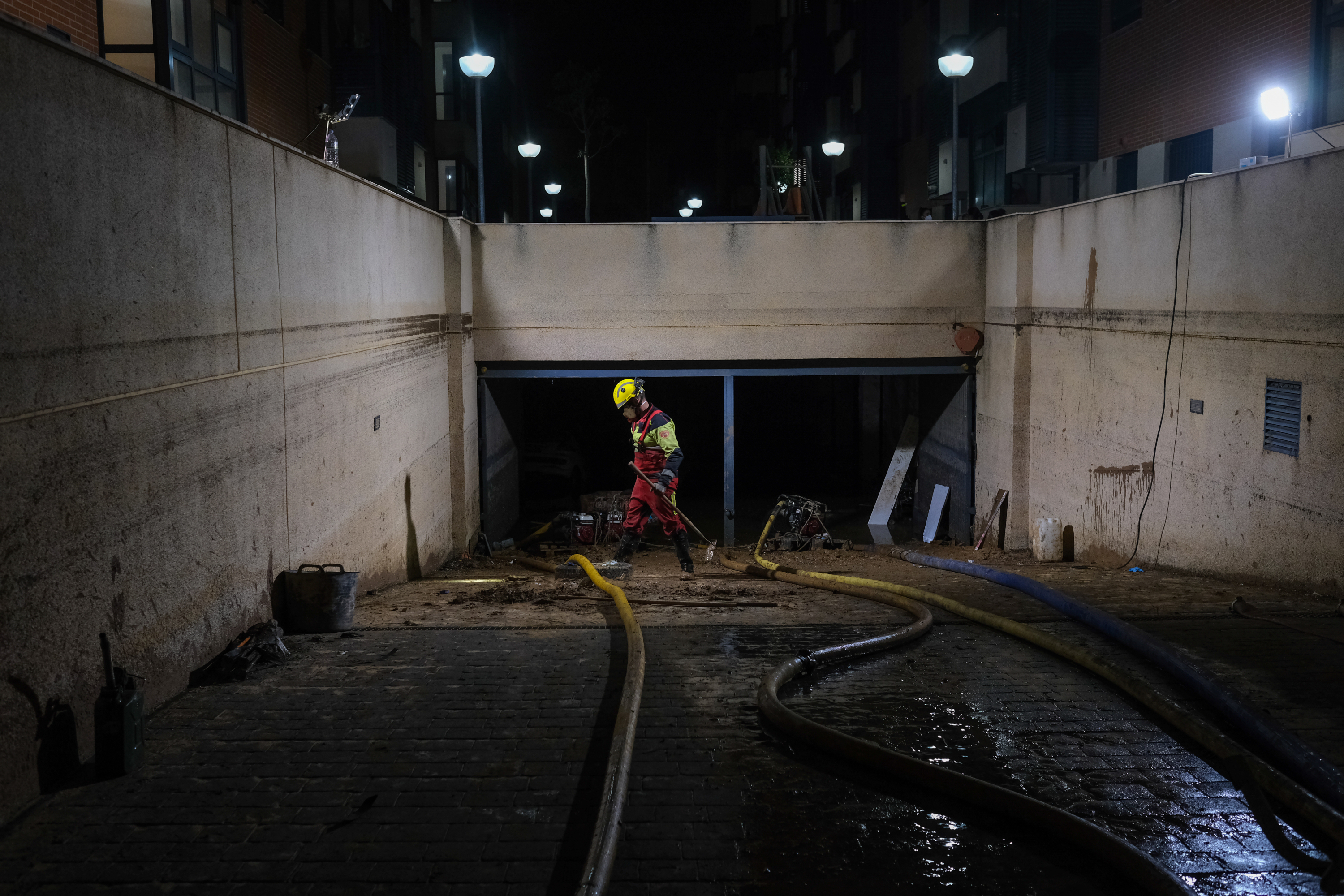
Water removal works from a parking lot in Paiporta.
Ballesteros in his house in Utiel also had no gas this Monday, while the operation of water, electricity and internet was still intermittent. For example, he couldn’t shower until almost the weekend. then spending almost four days living with mud and dirt.
In Paiporta, as in many other municipalities, Miranzo has experienced first-hand how more agile young people The first days they jumped over car barriers to try to carry medication or a can of food to elderly people who had been trapped in the barricades formed by vehicles and destroyed furniture. “The scenes have been terrifying,” he describes.
Furthermore, everything happens in the midst of a smell that mixes dead humans, dead animals, chemicals, stagnant water, mud, gasoline or gases from the heavy machinery that has been arriving. Ballesteros comments that a friend of his has been sick and vomiting. due, most likely, to some type of contamination. “In the first days, people took to the streets without thinking about wearing a mask, for example,” he points out. Now, wearing long sleeves, long pants, wellies, gloves and a face mask is essential when going into the garage and working on cleaning, especially premises and houses.
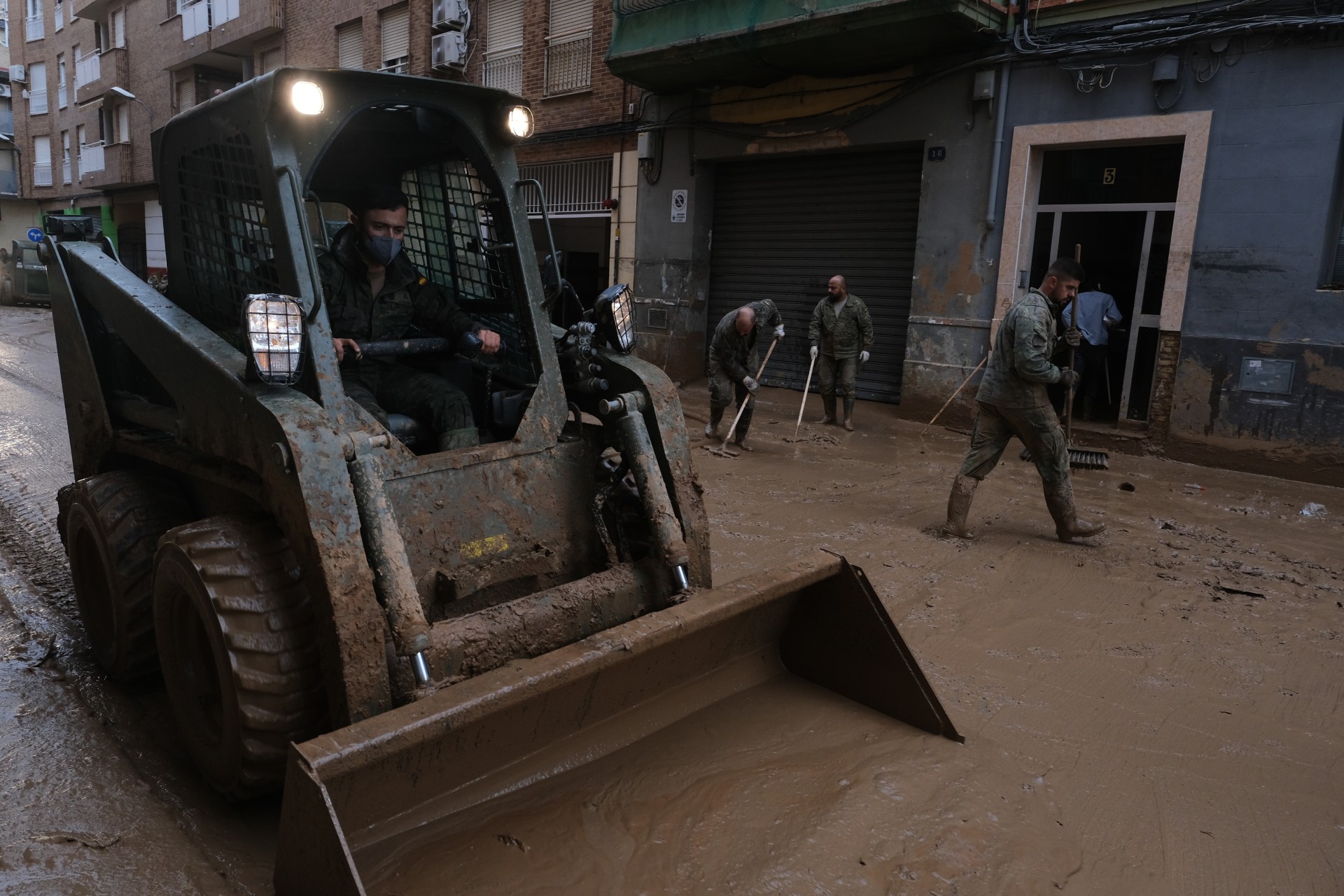
Military cleans one of the streets devastated by DANA
“I have started photographing garages and The other day I saw how they took a body in a bag out of a parking lot full of water and waste that smelled bad. Furthermore, when they pump out the water, it releases a lot of carbon monoxide,” says the photographer from Elche.
He, who has been covering the Russian invasion in Ukraine, has memories of what he is experiencing: “There are soldiers directing traffic to restore some order. You can tell that it is a catastrophe in the sense that there are no traffic laws, you can park wherever you want and even go almost in the opposite direction. I was in Ukraine and it reminds me a lot. A catastrophe is a catastrophe and an army is an army. “It’s what you imagine of a war zone with everything in a mess, military trucks circulating, agents… You can’t think that this is Spain.”
Solidarity on all four sides
Another of the common denominators of these last seven days in the affected towns of Valencia is the solidarity that has been seen on every corner. The images of volunteers from all over Spain removing mud from other people’s houses with their brooms, of trucks and vans arriving full of food, water or boots or of people creating pages to geolocate people, portals where they can donate financially are constant.
“There is indignation due to lack of action by the authorities, but also a lot of emotion due to the solidarity of the people. It’s exciting to see that strangers from all over Spain come to help clean your house“says the photographer.
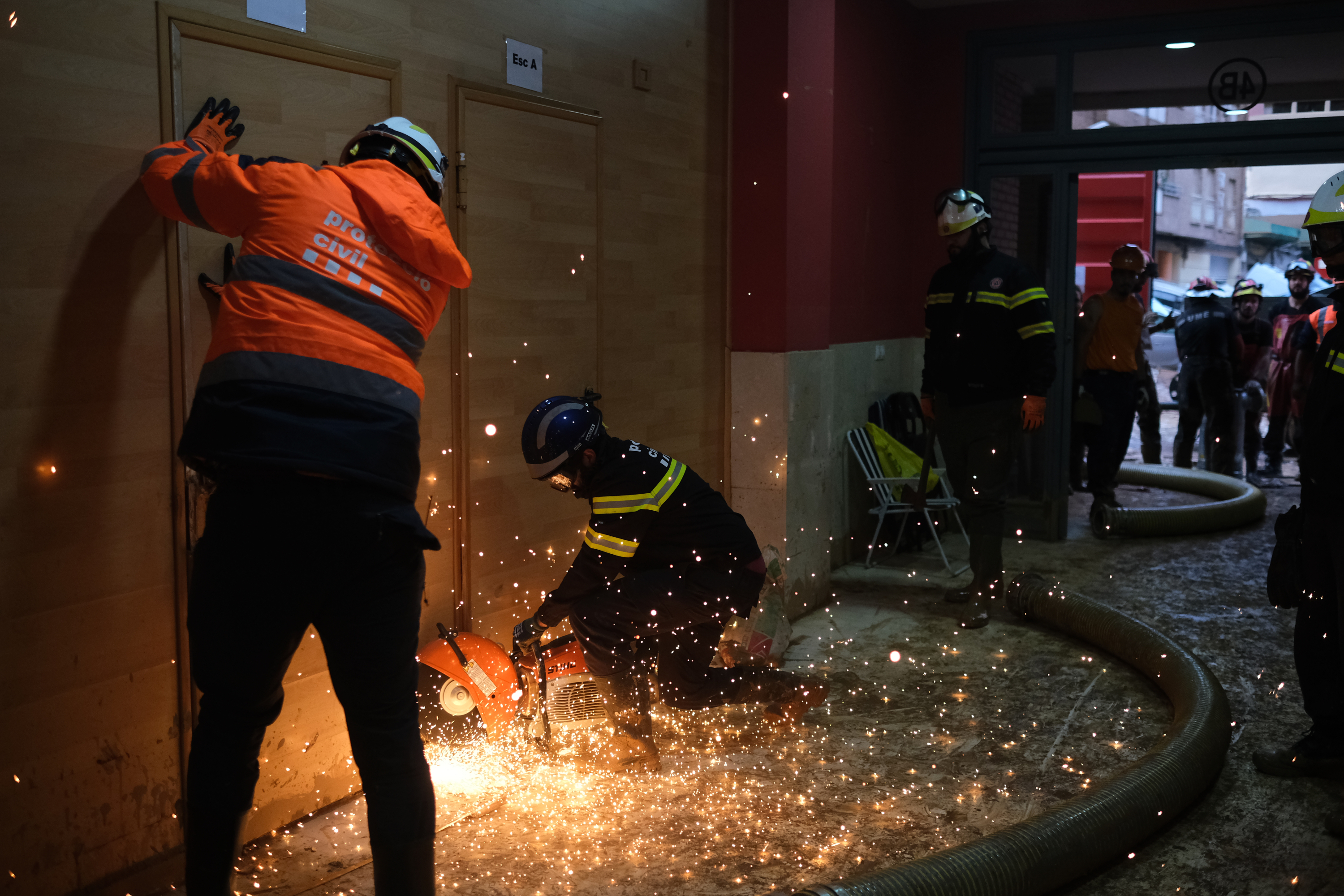
Some firefighters, entering a store in Paiporta.
He sometimes acts as a link between the pavilion where he stays and people who lack boots to walk down the street: “It is the most requested material. The mud doesn’t get in as much as if it were water, but it is true that after several days you end up with damaged feet. “I went with what I was wearing and on the third day I had to wear boots.”
Ballesteros, when talking about solidarity, does not hesitate to mention the case of the woman who was rescued by a firefighter and who filmed. She had lost everything. His house was low and was completely flooded with water. However, as he relates, The next day I was already taking water from other houses and, when they asked him, he said it was what he had to do.
“Also, at the social center they don’t accept more things because they are fine. I have opened a page to try to raise money of aid to be allocated to families and we have more than 2,000 euros. Everything that involves helping people is not enough,” he highlights.
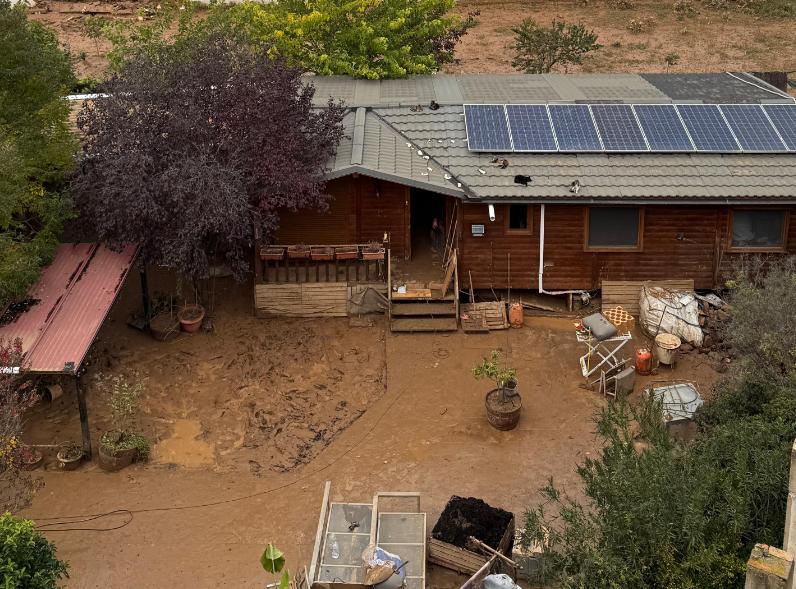
This is how the house of the neighbor rescued in Utiel looks like.
Ximo, when he arrived at the bar and saw that he could not keep the food, he took everything that could be used and began to make sandwiches to distribute to the displaced people who had traveled to Algemesí to work. “There are many displaced people with shovels, brooms, and water to clean. The population has turned a lot. People who came to my bar and then went to another“, he assures, saying that he has not yet contacted the insurer but that until December he does not believe he will be able to reopen. “He thinks that the companies that supply us with products have also been affected and have lost their material,” he specifies.
Miranzo a young man he directly gave him the keys to his house so that he could spend a night there instead of in the Catarroja pavilion because he was going to Valencia. .
Everyone appreciates the social response of the population, but asks governments for greater collaboration, aid and a much stronger reaction to return to normality within lives that will no longer be the same since last October 29.
Source: www.huffingtonpost.es


